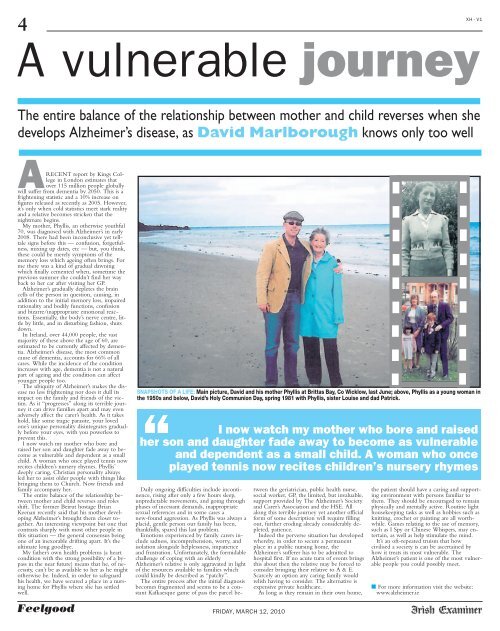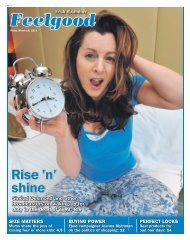Feelgood - Irish Examiner
Feelgood - Irish Examiner
Feelgood - Irish Examiner
- No tags were found...
Create successful ePaper yourself
Turn your PDF publications into a flip-book with our unique Google optimized e-Paper software.
TERAPROOF:User:irenefeighanDate:10/03/2010Time:17:22:37Edition:12/03/2010<strong>Feelgood</strong>XH1203Page:4Zone:XH4A vulnerable journeyXH - V1The entire balance of the relationship between mother and child reverses when shedevelops Alzheimer’s disease, as David Marlborough knows only too wellARECENT report by Kings Collegein London estimates thatover 115 million people globallywill suffer from dementia by 2050. This is afrightening statistic and a 10% increase onfigures released as recently as 2005. However,it’s only when cold statistics meet stark realityand a relative becomes stricken that thenightmare begins.My mother, Phyllis, an otherwise youthful70, was diagnosed with Alzheimer’s in early2008. There had been inconclusive yet telltalesigns before this — confusion, forgetfulness,mixing up dates, etc — but, you think,these could be merely symptoms of thememory loss which ageing often brings. Forme there was a kind of gradual dawningwhich finally cemented when, sometime theprevious summer she couldn’t find her wayback to her car after visiting her GP.Alzheimer’s gradually depletes the braincells of the person in question, causing, inaddition to the initial memory loss, impairedrationality and bodily functions, confusionand bizarre/inappropriate emotional reactions.Essentially, the body’s nerve centre, littleby little, and in disturbing fashion, shutsdown.In Ireland, over 44,000 people, the vastmajority of these above the age of 60, areestimated to be currently affected by dementia.Alzheimer’s disease, the most commoncause of dementia, accounts for 66% of allcases. While the incidence of the conditionincreases with age, dementia is not a naturalpart of ageing and the condition can affectyounger people too.The ubiquity of Alzheimer’s makes the diseaseno less frightening nor does it dull itsimpact on the family and friends of the victim.As it “progresses” along its terrible journeyit can drive families apart and may evenadversely affect the carer’s health. As it takeshold, like some tragic parasite, your lovedone’s unique personality disintegrates graduallybefore your eyes, with you powerless toprevent this.I now watch my mother who bore andraised her son and daughter fade away to becomeas vulnerable and dependent as a smallchild. A woman who once played tennis nowrecites children’s nursery rhymes. Phyllis’deeply caring, Christian personality alwaysled her to assist older people with things likebringing them to Church. Now friends andfamily accompany her.The entire balance of the relationship betweenmother and child reverses and rolesshift. The former Beirut hostage BrianKeenan recently said that his mother developingAlzheimer’s brought them closer together.An interesting viewpoint but one thatcontrasts sharply with most other people inthis situation — the general consensus beingone of an inexorable drifting apart. It’s theultimate long goodbye.My father’s own health problems (a heartcondition with the strong possibility of a bypassin the near future) means that he, of necessity,can’t be as available to her as he mightotherwise be. Indeed, in order to safeguardhis health, we have secured a place in a nursinghome for Phyllis where she has settledwell.<strong>Feelgood</strong>SNAPSHOTS OF A LIFE: Main picture, David and his mother Phyllis at Brittas Bay, Co Wicklow, last June; above, Phyllis as a young woman inthe 1950s and below, David’s Holy Communion Day, spring 1981 with Phyllis, sister Louise and dad Patrick.I now watch my mother who bore and raisedher son and daughter fade away to become as vulnerableand dependent as a small child. A woman who onceplayed tennis now recites children’s nursery rhymesFRIDAY, MARCH 12, 2010Daily ongoing difficulties include incontinence,rising after only a few hours sleep,unpredictable movements, and going throughphases of incessant demands, inappropriatesexual references and in some cases anew-found aggression. As Phyllis was always aplacid, gentle person our family has been,thankfully, spared this last problem.Emotions experienced by family carers includesadness, incomprehension, worry, andisolation alongside helplessness, impatienceand frustration. Unfortunately, the formidablechallenge of coping with an elderlyAlzheimer’s relative is only aggravated in lightof the resources available to families whichcould kindly be described as “patchy”.The entire process after the initial diagnosisbecomes fragmented and seems to be a constantKafkaesque game of pass the parcel betweenthe geriatrician, public health nurse,social worker, GP, the limited, but invaluable,support provided by The Alzheimer’s Societyand Carer’s Association and the HSE. Allalong this terrible journey yet another officialform of some description will require fillingout, further eroding already considerably depleted,patience.Indeed the perverse situation has developedwhereby, in order to secure a permanentplace in a public nursing home, theAlzheimer’s sufferer has to be admitted tohospital first. If no acute turn of events bringsthis about then the relative may be forced toconsider bringing their relative to A & E.Scarcely an option any caring family wouldrelish having to consider. The alternative isexpensive private healthcare.As long as they remain in their own home,the patient should have a caring and supportingenvironment with persons familiar tothem. They should be encouraged to remainphysically and mentally active. Routine lighthousekeeping tasks as well as hobbies such asknitting, crochet or painting are all worthwhile.Games relating to the use of memory,such as I Spy or Chinese Whispers, may entertain,as well as help stimulate the mind.It’s an oft-repeated truism that howcivilised a society is can be ascertained byhow it treats its most vulnerable. TheAlzheimer’s patient is one of the most vulnerablepeople you could possibly meet.■ For more information visit the website:www.alzheimer.ie












